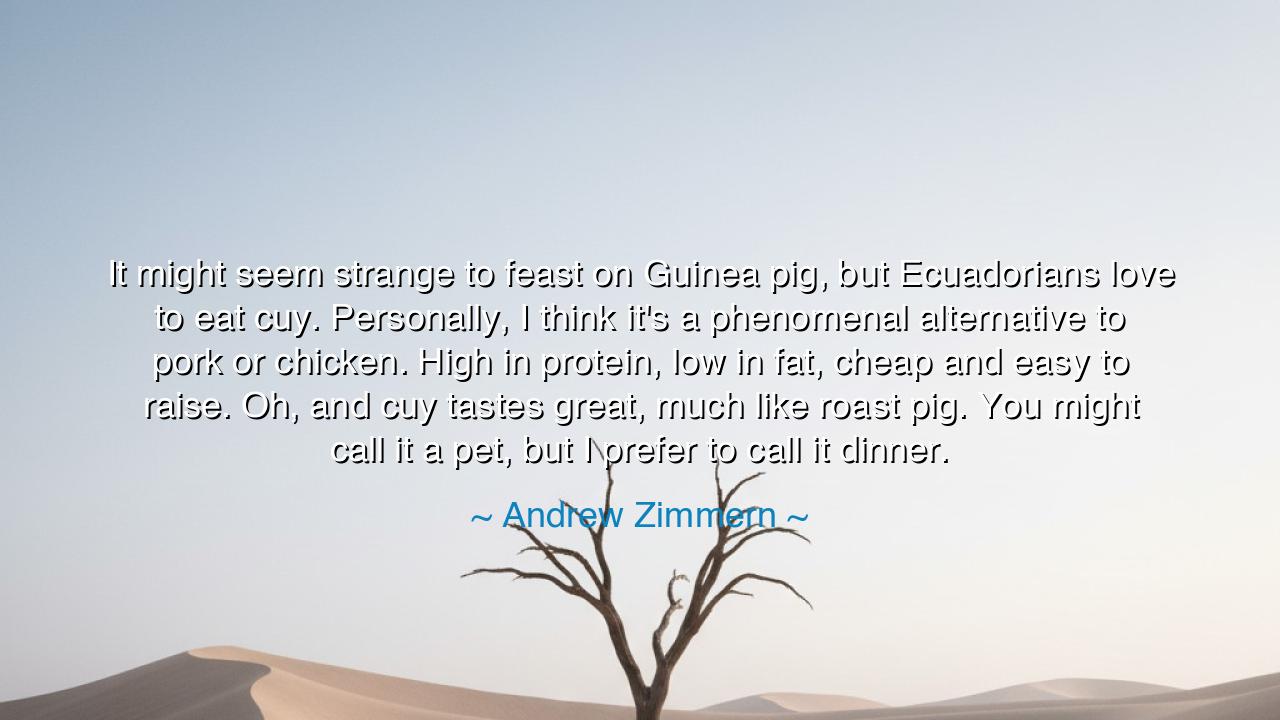
It might seem strange to feast on Guinea pig, but Ecuadorians
It might seem strange to feast on Guinea pig, but Ecuadorians love to eat cuy. Personally, I think it's a phenomenal alternative to pork or chicken. High in protein, low in fat, cheap and easy to raise. Oh, and cuy tastes great, much like roast pig. You might call it a pet, but I prefer to call it dinner.






Hear, O listeners, the words of Andrew Zimmern: “It might seem strange to feast on Guinea pig, but Ecuadorians love to eat cuy. Personally, I think it’s a phenomenal alternative to pork or chicken. High in protein, low in fat, cheap and easy to raise. Oh, and cuy tastes great, much like roast pig. You might call it a pet, but I prefer to call it dinner.” Though wrapped in humor, these words carry a truth both ancient and profound: that what one culture sees as sacred, another may see as sustenance; and that the measure of food is not in the judgments of outsiders, but in the nourishment it provides and the traditions it sustains.
The cuy, small yet mighty in meaning, has been raised and eaten in the Andes for thousands of years. Long before European conquest, the peoples of Peru and Ecuador honored the animal not only as food, but as part of ritual and ceremony. In its flesh they found protein to strengthen their bodies, in its abundance they found security, and in its care they found economy. To laugh at this practice is to forget that every culture holds its own sacred table, and that what seems strange to one is wisdom to another.
Zimmern’s words strike at the heart of prejudice in food. Many scoff at the eating of cuy because in distant lands it is seen as a household pet, a creature to be stroked and cherished. Yet is this not the same paradox faced when a Hindu beholds a Western steak, or when a devout Buddhist sees the slaughter of chickens? The ancients knew: one man’s sacrifice is another’s blasphemy. Thus, the wise do not mock the customs of the table but seek to understand them. For food is not mere sustenance—it is the language of culture, the bridge between man and land, tradition and survival.
Consider the Incan empire. Its warriors marched across mountains sustained by cuy, maize, and quinoa. Without these foods, battles would not have been fought, empires would not have risen, and history itself would have taken another course. Here lies the teaching: the humble Guinea pig became, in its land, a pillar of strength, every bit as important as cattle in Europe or rice in Asia. The greatness of a culture is written in the food it gathers from its soil and raises in its hearth.
Zimmern’s declaration—“I prefer to call it dinner”—is more than jest; it is a challenge. It calls us to cast off arrogance and to honor the traditions of others. It is easy to ridicule the unfamiliar, but wisdom lies in tasting, in experiencing, in learning. The act of eating another culture’s dish is not only nourishment but communion, a breaking of barriers, a dissolving of judgment. To eat the cuy is not to betray one’s own customs, but to honor the people whose lives are shaped by it.
The lesson for us is clear: let us walk humbly when we encounter the table of another people. Let us not bring the gaze of contempt, but the spirit of curiosity. For in every dish lies a story, in every flavor lies a history. What may seem lowly to the outsider may be sacred to the native, and what seems strange may be the very secret of survival. If we refuse to taste, we refuse to learn; but if we taste, we partake in the wisdom of centuries.
Practically, this means: when you travel, eat not only what you know, but also what the land itself offers. Taste with respect, learn with reverence, and in so doing, you honor both the food and the people who serve it. Approach with the courage of the ancients who sought new worlds, and you will find your spirit enlarged, your prejudice diminished, your understanding deepened.
Therefore, O seekers of wisdom, remember Zimmern’s lesson: the line between pet and dinner is drawn differently across the earth, and that difference is not shameful but wondrous. In honoring it, we honor the rich tapestry of humanity. Eat with an open heart, and you will find that the feast becomes not only nourishment to the body, but enlightenment to the soul.






AAdministratorAdministrator
Welcome, honored guests. Please leave a comment, we will respond soon